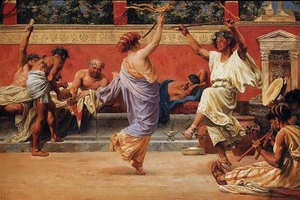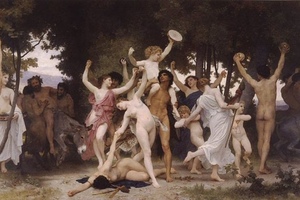Saturnalia
Saturnalia (Latin: Saturnalia) was an ancient Roman festival in honor of Saturn, associated with agriculture and the early successes of culture. It was originally celebrated on December 17, but later the festivities were extended to December 23.
The festival was held annually on December 17. This marked the end of agricultural work, and everyone sought rest and celebrations in connection with the completion of the harvest. In 217 BC, it was modified somewhat to resemble the Greek Kronia, with the introduction of lectisternium (a banquet for the gods) and the custom of standing with uncovered heads during sacrifices.
The ritual part of the celebration had a distinctly Roman character. Public festivities began with a sacrifice in front of the Temple of Saturn in the Forum, followed by a religious feast attended by senators and horsemen dressed in special attire. In families, the day started with a sacrifice. The streets were filled with crowds. Everywhere, shouts of "Io Saturnalia" (pronounced [i.oː saːtʊrˈnaːli.a]; known as clamare Saturnalia) could be heard. Joy prevailed everywhere, candles were burned, and "Queen of Saturnalia" and "King of Saturnalia" were chosen. People exchanged gifts, including cerei (wax candles) and sigillaria (figurines made of terracotta or dough). Cerei symbolized that Saturnalia coincided with the winter solstice (bruma). Sigillaria were remnants of the sacrificial ritual to Saturn. The festive amusements continued for 5-7 days.
During Saturnalia, public business was suspended, students were exempt from classes, and criminals were not to be punished. Slaves were granted special privileges: they were relieved from regular work, allowed to wear the pilleus (a cap symbolizing freedom), permitted to dine at the master's table dressed in the master's clothes, and even received services from their masters. According to Marquardt, this was essentially a festival for slaves. During these days, they enjoyed equal rights with their masters, in honor of the universal equality that was believed to have existed during Saturn's reign.
Many scholars note the connection between Saturnalia and the December festivities of other European peoples, such as the Christmas celebrations and the Feast of Fools, Yule, Christmas, and so on. Many of the rituals were incorporated into Christian Christmas traditions, making Saturnalia a precursor to New Year celebrations as well.
Literature
- Macrobius, Saturnali. Translated from Latin and Greek by Professor V. T. Zvirevich. Issadon, volume IV, 2007
- The reciprocal influences of the Saturnalia, Germanic solstitial festivals, Christmas, and Chanukkah are familiar, notes C. Bennet Pascal, October Horse, Harvard Studies in Classical Philology 85 (1981), p. 289.
- Bacchanalia and Saturnalia, in The Classical Tradition, edited by Э. Графтон, Glenn W. Most[en], and Salvatore Settis (Harvard University Press, 2010), p. 116.
- Saturn / E. M. Shtaerman / / Myths of the peoples of the world: An Encyclopedia in 2 volumes / ch. ed.by S. A. Tokarev. -2nd ed. — Moscow : Sovetskaya entsiklopediya, 1988. - Vol. 2: K-Ya — - p. 901.
- Botvinnik M. N., Kogan M. A., Rabinovich M. B., Seletsky B. P. Mifologicheskiy slovar ' [Mythological Dictionary]. 4th ed., Moscow: Prosveshchenie Publ., 1985, p. 128.
- Elnitskiy L. A. O sotsial'nykh ideyakh Saturnalii [On the social ideas of Saturnalia]. — 1946. — № 4.
- Obnorsky N. P. Saturnalia, holiday // Encyclopedia of Brockhaus and Efron : in 86 volumes (82 volumes and 4 additions). - St. Petersburg, 1890-1907




